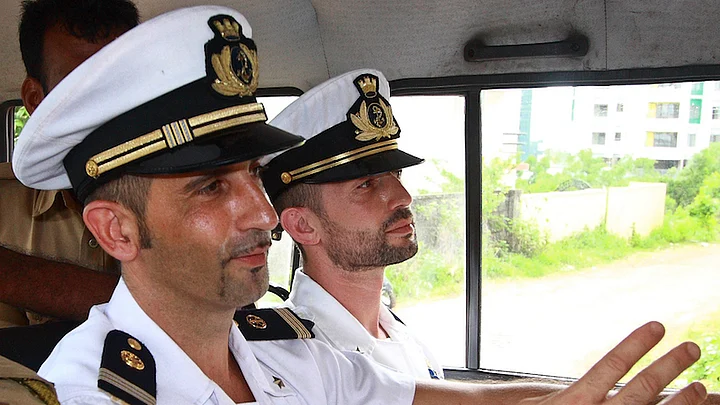February 15, 2012
Three years ago, two Italian marines shot dead two Indian fishermen Jelestine and Ajeesh Pinku. Latorre Massimiliano and Salvatore Girone were deputed with a merchant navy vessel Enrice Lexie and thought they were firing warning shots at pirates. The Italians claim the shooting took place in international waters. India contradicts that stand and says the merchant ship was well within Indian territory. This basic disagreement is at the core of this legal dilemma.
February 16, 2012
The next day a team of Coast Guard and Coastal Police personnel boarded the ship for a detailed investigation. Vice-Admiral K.N Sushil, the Flag Officer Commanding-in-Chief of the Southern Naval command told The Hindu
If they thought they were being chased by a pirate vessel, they should have carried out evasive manoeuvres to alter the course of the ship, as enunciated by the guidelines. If the skiff was still after them, they would’ve fired fire a few warning shots well above the bow of the pirate vessel to deter it. Unfortunately, they do not seem to have done any of this.`
February 19, 2012
S.M Krishna wanted the captain of the ship and the two Italian marines to surrender. His Italian counterpart Giulio Terzi di Sant’ Agata, who later lost his job for mishandling the case, wanted the three to return to Italy and a joint investigation into the incident. India refused to relent and the Kerala Police arrested the two Italian marines.
April 20–30, 2012
The judicial procedures that have followed since have soured our bilateral ties with Italy. The matter would’ve been settled with an out-of-court settlement that involved the payment of Rs 1 crore in compensation or “blood money” to the families of the two deceased fishermen. But, an astonished Supreme Court ruled that the compromise was illegal and accused the Italians of “playing with the Indian law”.
March 11, 2013
Italy refused to return the marines, who face a 196-page chargesheet, to India after they’d been given permission to travel home to vote in the country’s election. Italy relented only when the Supreme Court backed the government’s decision to stop Italian Ambassador Daniele Mancini from India.
Despite the case being handed over to the NIA, the case dragged on. As a result, diplomatic ties between the two countries reached an all-time low in 2013.
February 7, 2014
Under pressure from Europe, India dropped the charges that could have invited the death penalty for the Italian marines.
August 31, 2014
The Supreme Court allowed Latorre Massimiliano to return home after he suffered a stroke. He’s been in Italy since and has managed to secure extension after extension on his stay. Also on bail, the second marine Salvatore Girone is housed in the Italian embassy.
June 26, 2015
Having given up on the Indian judicial system, Italy has launched international arbitration. It means that the two Italian marines will be within the framework of the United Nations Convention on the Law of the Sea. Under UNCLOS, both parties can seek arbitration through an ad hoc panel or the creation of a special tribunal.
Another option is to seek a judgement from the International Court of Justice in the Hague or the International Tribunal for the Law of the Sea, in Hamburg, Germany.
Italy has made a request for both the marines to be allowed to stay on Italian soil pending the outcome of this arbitration.
(At The Quint, we question everything. Play an active role in shaping our journalism by becoming a member today.)
